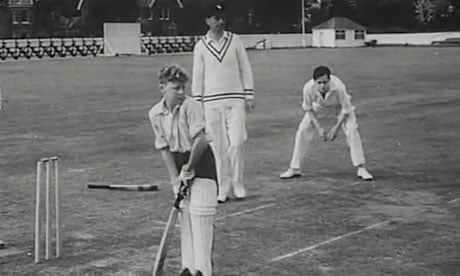Films commissioned more than 50 years ago by the British Council to showcase the best of Britain to the rest of the world – whether that was a sense of fair play, cricket or the joys of congregated drinking in places "called 'public' houses" – have been digitised and are being released online for the first time.
The films were made for about 20 years, between the 1930s and 1950s, and give fascinating snapshots of largely cheery lives being lived in the UK.
They would have been shown across the world in embassies and consulates, promoting democratic values and the benefits of good relations with Britain as fascism spread across Europe.
The films, kept in the BFI archive, have been largely unseen for 30 years. Martin Davidson, the British Council's chief executive, said the films were from a time when propaganda was far more important.
"We're showing some very nice snippets of how cultural relations happened in the past, and we can perhaps contrast it with how things happen these days. We now have a much more mutual way of doing things," he said.
So far, 13 films are available online with about 160 left to go.
The ones online include Cricket, from 1948, in which the clipped thespian tones of Ralph Richardson and the reassuring Hampshire burr of John Arlott narrate the game's traditions and rituals as well as a practical demonstration of how to bowl a leg break.
The film follows England's Ashes defeat at Lord's to Don Bradman's Australia. "But victory is the least that men play cricket for," concludes Richardson, unconvincingly.
"They play it for a host of reasons, ill defined and hard to seek. On school ground, on city street, on village green, they play on. For the urge wells deep from quiet places in men and in the land they spring from."
Sam Milsom, the project's assistant co-ordinator, is one of six young people working on the scheme that was created as part of the Digital Domesday project set up by the charity New Deal of the Mind, in which funded work placements are created for young unemployed people.
One of Milsom's favourite films is a fascinating but plodding educational film on the history of the English language, which makes you wonder how interested audiences would ever be in the gathering of "many new and useful words to do with shipping" from the Dutch. The words include "buoy" and [very long pause] "skipper" and [very long pause] "deck" and [very long pause] "dock".
The viewer also finds out words taken from Spanish ("comrade"), Portugal ("port wine"), India ("cockatoo") and Germany – ("plunder", of course).
The 1945 general election is told through a randomly chosen case study – Kettering – in which the pre-scandal Lieutenant Colonel John Profumo is standing for re-election for the Conservatives.
It includes a hilarious staged meeting between Profumo and his agent – "How many meetings have you got tonight?" Profumo asks his agent. "Five." "Five? Crippen, that's a lot, where are they?" And there is hustings footage in which the 30-year-old Profumo gets passionate. "I believe in being governed but not in being spoonfed – and kicked and patted and cursed and praised and erected and fined and licensed and exalted – all the time!" Perhaps the wrong sort of passion, given he lost his seat.
There are some beautifully shot films in the collection, perhaps not surprising when the makers included Jack Cardiff – who went on to success with Powell and Pressburger – as well as Ken Annakin (Battle of the Bulge) and Geoffrey Unsworth (An American in Paris, 2001: A Space Odyssey) who shot – in Technicolor – a visually stunning film about Kew Gardens called World Garden.

Comments (…)
Sign in or create your Guardian account to join the discussion